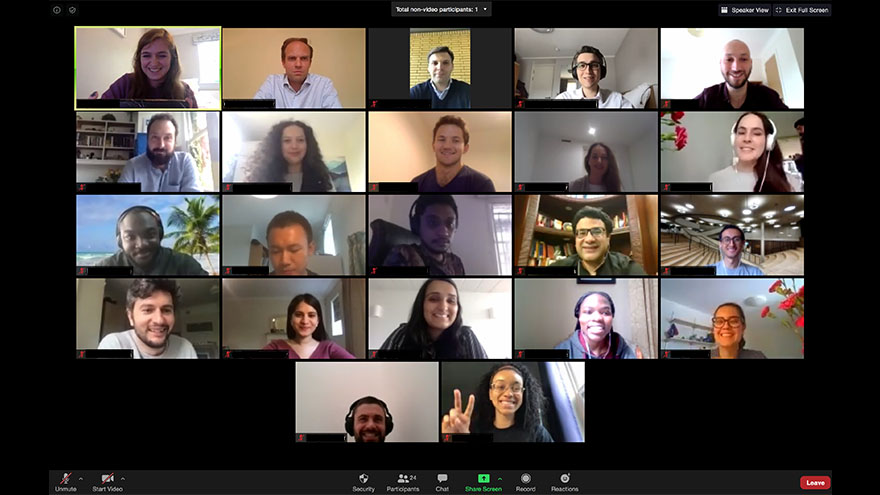Delivering learning excellence under lockdown: how the Oxford MPP continues to innovate

Even in 'normal' times, there’s nothing ordinary about the pace of innovation at the Blavatnik School. This was a school created to take on some of the biggest public policy challenges of our time, including climate change, inequality, extremism and corruption. So, when the COVID-19 crisis hit, it wasn’t surprising to see the entire staff, faculty and student body at the Blavatnik School roll up their sleeves and say, 'What can we do to make this better?'

That can-do attitude has ensured that teaching and learning in the Oxford Master of Public Policy (MPP) remains ahead of the curve – nothing less would be acceptable of an institution fuelled by excellence. This week marked the first week of teaching of Trinity Term, and our 123 MPP students have returned to our classrooms, albeit remotely from nearly every major-inhabited timezone. Over the next eight weeks, they will be experiencing the learning that has made the School so effective, but now pivoted to be social distancing proof.
Watching the pandemic unfold towards the end of Hilary Term, the team here began preparing for the inevitable move towards remote delivery of the remainder of this academic year. We set up pilot sessions with students, which demonstrated that it’s not the technology that poses the main challenge to teaching online; rather it’s getting the learning culture right that matters most. We then enlisted over 100 alumni (from 50 countries and representing every one of our previous graduating classes) to volunteer in ‘practice’ sessions aimed at helping our faculty crystallise that culture.
To facilitate continual improvements to that culture over the course of the term, Emily Jones, Associate Professor in Public Policy, and Chris Stone, Professor of Practice of Public Integrity, have initiated a community of practice – a regular meeting for faculty members to exchange ideas and share successes. Meanwhile, professional staff from various parts of the School have been trained and redeployed as online learning facilitators, handling the technical logistics of online sessions and setting up and managing the class. With classes running smoothly, students can concentrate on engaging with course material, participating in discussion and bringing out the best learning for each other.
By leveraging our people and the features of technology, we’ve been able to translate the interactive, peer-driven, highly personalised teaching style that is a key characteristic of the MPP into what Dean Ngaire Woods calls a ‘virtual-in-person’ (VIP) learning experience.
As a public policy school, the subject of how governments should respond (and are responding) to the coronavirus pandemic has been a significant topic of research here, and this is also reflected in our teaching. Policy challenge II, in which students participate in a negotiations simulation on one of three topics, takes place in Trinity Term. It is a cornerstone of the MPP’s applied teaching style, requiring students to move beyond theoretical frameworks to address the challenges and limitations of real-life policymaking. Emily Jones and Anna Petherick, Departmental Lecturer in Public Policy, have worked at speed to develop a COVID-19 simulation option this year, allowing students to address a policy challenge that they are witnessing unfold in real time. The other two simulations that form part of policy challenge II tackle equally important issues that governments around the world are confronting: climate change, and cyber-security and counterterrorism.
Beyond the classroom, the social connections that students make with each other are one of the lasting features of their time at the Blavatnik School. Traditions such as the weekly Friday night gathering or regular coffee mornings continue unhindered (obviously, students will have to provide their own non-virtual beverage of choice!); regular drop-in sessions with faculty offer a valuable source of academic and personal support; and whole-class meetings give everyone the opportunity to stay in touch and regularly see familiar faces. Students also have access to a range of wellbeing support across the School and University, for example through the School’s welfare coordinator or college welfare teams. Other elements of life at the School, such as events and speaker visits, are continuing in an online format.
Reflecting on the past month, it has been inspiring to see how quickly a community of doers can repurpose its practices in the face of adversity to sustain and further excellence. For those of you joining us in September, we look forward to welcoming you to this community, which will serve as your second family for the rest of your lives.
Karthik Ramanna and Adam Webster are programme directors of the Master of Public Policy.
